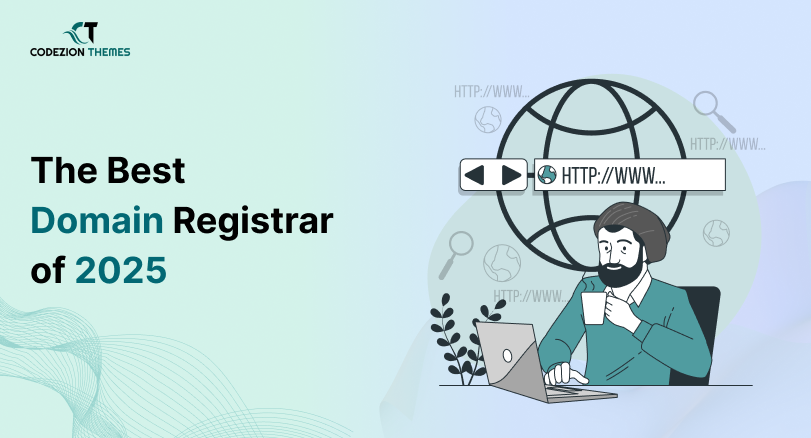Best Domain Registrar in 2025: Ultimate Guide to Choosing Your Domain Provider

Finding the best domain registrar is the first crucial step in establishing your online presence. Whether you’re launching a personal blog, an e-commerce store, or a corporate website, choosing the right provider can save you money, give you flexible management tools, and protect your privacy. In this in-depth guide, we’ll walk you through everything you need to know—from understanding what a domain registrar is to tips on picking the perfect domain name. By the end, you’ll know exactly which provider is the best place to buy domain name services in 2025.
What Is a Domain Registrar?
A domain registrar is an organization accredited by the Internet Corporation for Assigned Names and Numbers (ICANN) to sell and manage domain names. When you register a domain—say, yourbrand.com—you’re essentially leasing that address from the registrar for a set period (usually one to ten years). Registrars maintain your registration details in the global WHOIS database and ensure that your domain points to the correct server when someone types it into their browser.
Key functions of a domain registrar include:
- - Domain Lookup and Registration: Search available names and register your chosen domain.
- - DNS Management:Configure domain name system (DNS) records (A, CNAME, MX) to link your domain to hosting, email, and other services.
- - Renewals and Transfers:Keep your domain active through renewals or move it to another registrar via the transfer process.
How To Choose the Best Domain Name Registrar
Not all registrars are created equal. Here are factors to weigh when deciding on the best domain name registrar:
- Pricing and Renewal Rates: Look beyond the introductory cost. Some registrars lock you into higher renewal fees after the first year. Check for transparent pricing—ideally, one flat rate for registration and renewals.
- Privacy Protection: WHOIS privacy should be included or available at an affordable rate. Avoid registrars that charge exorbitant fees for domain privacy.
- User Interface and Support: A clean, intuitive control panel makes DNS management and domain transfers a breeze. Reliable 24/7 customer support via chat, email, or phone can save you headaches.
- Transfer Policies: Confirm the registrar’s lock/unlock process for transfers. Some registrars impose waiting periods or surcharges on transfers.
- Extra Features: Look for free DNSSEC, URL forwarding, and easy integration with hosting. Bundles—such as email hosting or SSL certificates—can provide added value.
Top Domain Registrars of 2025
Here’s our curated list of the top domain registrars you should consider this year:
1. GoDaddy
As the world’s largest registrar, GoDaddy offers an unparalleled selection of TLDs, a 24/7 support team, and a suite of add-ons (hosting, SSL certificates, website builder). Its intuitive marketplace makes it easy to find premium domains, though you should watch for upsells and higher renewal fees.
2. Namecheap
Consistently ranked among the best overall, Namecheap combines transparent pricing with free WHOIS privacy for life. Its clean, ad-free dashboard simplifies DNS management, and its customer support (live chat & tickets) earns high marks from users on tight budgets.
3. Dynadot
Ideal for domain‐portfolio holders, Dynadot offers low baseline pricing, frequent promotional codes, and bulk‐registration discounts. Advanced DNS controls—including URL frame, masking, and DNSSEC—are included, and privacy is free on many extensions.
4. IONOS by 1&1
Europe’s leading hosting provider delivers straightforward, no-nonsense domain pricing. Every domain comes with free DNSSEC and an SSL certificate in the first year, plus round-the-clock phone support for businesses that prefer human assistance.
5. Hostinger
Known for budget hosting, Hostinger also excels at domains. Their AI-powered name suggestion tool helps you brainstorm, while below-market entry rates and automatic WHOIS protection (on select TLDs) make them a solid choice for startups.
6. Domain.com
A specialist in domains and related services (SSL, email), Domain.com’s platform is tailored for beginners. The control panel is uncluttered, renewal and transfer fees are competitive, and bundled SSL certs make it easy to secure both your domain and website.
7. Name.com
This registrar’s strength lies in its balance—transparent, mid-range pricing; free privacy on most domains; and a straightforward site-builder integration. Its “bulk actions” interface simplifies mass updates for DNS or contact info.
8. Network Solutions
One of the internet’s original registrars (est. 1993), it remains a go-to for enterprise clients who need legacy DNS features and phone-based account management. Fees tend to be higher, but you gain robust SLAs and a proven track record.
9. Bluehost
While primarily a hosting company, Bluehost sweetens its shared-hosting plans with a free domain for the first year. Post-promotion renewal rates are in line with the industry, and built-in WordPress integration makes setup a breeze for bloggers.
10. Porkbun
The rising star of 2025, Porkbun wins users over with its ultra-transparent pricing (no hidden fees), free WHOIS privacy on every domain, and modern, minimal-upsell interface. Their “one-click” DNS templates streamline connections to popular platforms like Shopify and Wix.
How Much Does a Domain Name Cost?
The cost of a domain name varies based on factors such as the top-level domain (TLD), registrar promotions, and added services:
- - Standard .com/.net/.org: Typically $10–$20 per year for both registration and renewal.
- - Country-Code TLDs (ccTLDs): Varies widely—some under $5/year, others $50+.
- - Premium Domains: High-value, short, or keyword-rich domains can range from $100 to thousands of dollars upfront.
- - Bundled Services: Adding WHOIS privacy or SSL certificates can add $5–$50/year.
- - Transfer Fees: Often equal to a one-year renewal fee; some registrars offer discounted transfers.
If budget is your primary concern, look for the cheapest domain registrar that still provides transparency. Remember, ultra-low prices may come with trade-offs—such as hidden fees or poor support—so weigh cost against quality.
Why WHOIS Privacy Is Important
When you register a domain, your personal details—name, address, email, and phone number—are entered into the public WHOIS database. Without privacy protection:
- - Spam and Harassment: Exposed email and phone numbers attract spammers and telemarketers.
- - Identity Theft: Public address and personal details can facilitate fraudulent activities.
- - Unwanted Attention: Scammers may impersonate you or your brand.
Most registrars offer WHOIS privacy (also known as “privacy protection” or “domain masking”) to shield your personal data. Some include it free of charge; others charge an annual fee. Given the risks, investing in privacy is well worth it when selecting the best domain registrar for your project.
How To Choose a Domain Name
Your domain name is your online identity. Here are best practices to help you pick a memorable, SEO-friendly domain:
- Keep It Short and Simple: Aim for 6–14 characters. Avoid hyphens and numbers, which can confuse users.
- Include Keywords (When Relevant): A keyword in your domain can boost SEO, but don’t force it. Ensure it still reads naturally: e.g., bestcoffeemug.com.
- Choose the Right Extension: .com remains the gold standard for global reach. Consider niche extensions (.io, .shop) if they align with your brand.
- Make It Brandable: Opt for a unique name that’s easy to pronounce and spell. Check social media handles and trademarks to avoid conflicts.
- Think Long-Term: Select a name that can grow with your business—avoiding overly narrow niches. Renew multi-year registrations for stability and SEO confidence.
Once you’ve zeroed in on a name, visit the best place to buy domain name services—such as NameCheap or Google Domains—to secure it before someone else does.
Conclusion
Choosing the best domain registrar in 2025 means balancing cost, privacy, support, and features. Start by defining your budget and must-have services, then compare top providers like NameCheap, Google Domains, and Hover. Secure your ideal domain name today at the best website to buy domain, and you’ll be well on your way to building a thriving online presence.
Looking to build a robust, high-performance site? Check out our comprehensive Web Development services to pair your new domain with top-tier design and hosting.
Frequently Asked Questions
1. Which domain registrar is best?
The “best” domain registrar depends on your priorities. For budget-conscious users who value privacy, NameCheap is often top of the list. For seamless Google integration, choose Google Domains. Hover and Dynadot excel in user experience and transparency.
2. What is the cheapest domain registrar?
While promotional pricing can make many registrars cheap in the first year, NameSilo and Dynadot consistently offer low renewal rates with free WHOIS privacy, making them strong contenders for the cheapest domain registrar.
3. Can I permanently buy a domain name?
No. Domain names are leased, not owned outright. The longest registration period per domain is typically ten years. You can pre-pay renewals but must renew periodically to retain ownership.
4. Can I get a domain name for free?
Some web hosts offer a free domain for the first year when you purchase a hosting plan. However, after the initial period, you’ll pay renewal fees—often higher than standalone registration costs.
5. How do I buy a domain name?
1. Use a domain registrar to search availability.
2. Add your chosen domain to the cart, along with WHOIS privacy if desired
3. Complete checkout and configure DNS to point to your hosting provider.
6. Can I transfer my domain immediately after purchase?
ICANN rules mandate a 60-day waiting period after initial registration before a transfer can occur. After 60 days, you can move your domain to another registrar without penalty.

